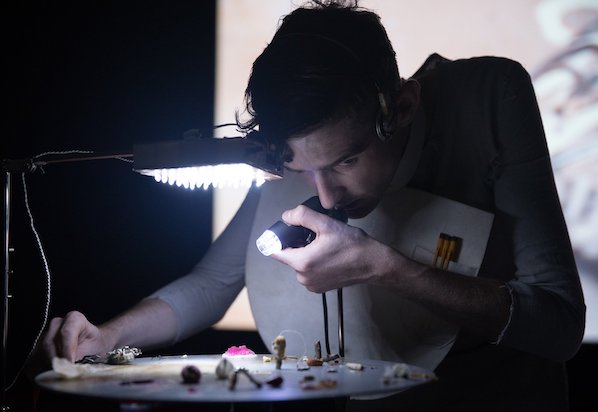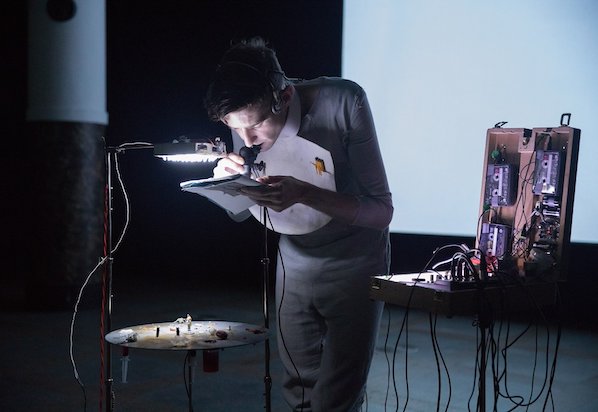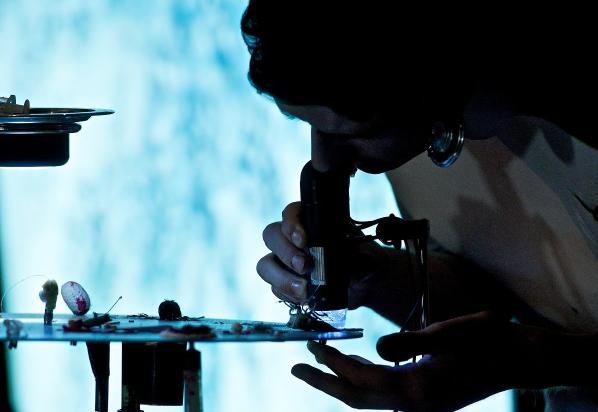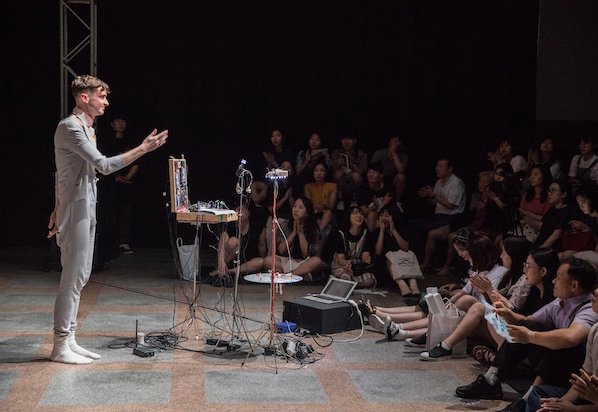
 Foto: Experimentální prostor NoD
Foto: Experimentální prostor NoDInterview with Tim Spooner by Marie Kobrlová.
Tim Spooer performed his production The Telescope in Theatre NoD in Prague on the 11th of November. Let’s have a look under the microscope once again and let’s witness the documentary about the strange landscape of magnetic and chemical adventures with him.
What was the first stimulus or impulse that initiated the idea of The Telescope?
It’s originally because all of my work comes from making things with my hands. So it’s sort of a sculptural starting point. It’s about sensibility. In the making things you are investigating material or substance, how it joints together and how it behaves in relation to other materials. The performance element became important because so many of these objects I was making seemed to need this life element to really show themselves as what they are. The needed some kind of demonstration to show them properly.
Where the idea of The Telescope came from?
Before I made The Telescope I was making a similar work but on slightly bigger scale. There were performances which were almost like demonstration of little sculptures of a size of my hands. They had interesting properties or moved in interesting way. Like little puppets or abstract puppets. But in making those performances I was frustrated because there was so many things going on the scale that you could only really see when you were very, very close.
 Foto: Experimentální prostor NoD
Foto: Experimentální prostor NoD
Why did you change these big puppets to smaller ones?
I think that it came naturally with that thing when you zoom in. And when you start to go beyond the normal human abilities. Because hands are in certain size, so we can manipulate things in a controlled way. On the smaller scale things are less controllable, so the objects sort of have more of their own expression. So I made everything smaller. But the little movements and these little details that were interesting weren’t really visible to the audiences. And that was what gave me the impetus to zoom in and to give a go to the technology of the microscope camera. The conceptual background to The Telescope was that I was reading Diderot and he was trying to express what consciousness is.
Are all substances you use somehow connected to each other?
What I find interesting is that these materials manifest themselves in very different ways. Some puppets are abstract, other things are joined up together, constructed in a way that manifest something you will recognise.
Are these substances more abstract or representative?
I like the idea of being opened to different peoples interpretations. I like to make things that are abstract enough to allow different perspectives, allow different people to bring something to it as an audience member to read it how they want. But at the same time I know there are certain things that we can all identify with. So I think it’s somewhere on that spectrum between abstract and representative, which are like a key for us.
Do these materials have any specific meaning?
Yes, the material has a very particular meaning because the performance was shown in a lot of different places and I always got a new fragments of a material from each place. So for example there are little bits of ham and parmesan cheese from Parma in Italy and another different bits from Korea. I have got these new little fragments from everywhere. To me in that way they have a very straightforward clear meaning.
 Foto: Experimentální prostor NoD
Foto: Experimentální prostor NoD
What are you primarily searching for?
I am searching for the new qualities that are there in the world. And I am really trying to listen to these objects, materials and substances to see what their tendencies or almost their desires are. I feel like I am getting a sense of almost empathy with these things, there is an inner world of them. And in that process I am sort of discovering more about what we are.
While you are animating these objects or substances are you distant from the action?
I am just trying to be opened all the time to what might be happening. Because every time I do it, different things happen. So it’s really following what these materials are doing.
You are moving with these substances and you need to say loads of text all at once. Are the words always the same?
Yes, it is. Until very recently I used to have the commentary on a recording in my ear because I am very bad at remembering. I always liked this way of performing because it’s not emotional – you hear something and you repeat it. It’s just reproducing. But now I know the text so well so that I`I’m not really using it. It felt suddenly fake to be having it in my ear. But I’m still reasonably distant from the action.
What kind of structures do you like to work with?
In other projects I’ve worked with structures that are usually considered as more traditional or more in a theatrical shape. I mean the structure starting from one point going to extreme and then coming back. I’ve done another show which is symmetrical in form. So it starts from very small and quiet moment and it builds up to the central point and then goes back over the same period of time. Which is really kind of anti-dramatic because the climax is in the centre of the show. It’s a strange structure, which is what I am interested in. For me it’s much more from the perspective of composition of the painting than dramaturgy. It’s more like balancing and composing elements within a time frame.
 Foto: Experimentální prostor NoD
Foto: Experimentální prostor NoD
Are you a demiurge, performer, technician or what is your position onstage?
I am really trying to pay as much attention as possible and be really focused. I think that it gives the most interesting possibilities. My position is to allow things to be as interesting as they are.
What do you think about the theory that the world is just a reflection of the observer?
I think that we project a world as much as we consume a world. We can see things, hear them, smell them, taste them, touch them. And those senses define what is perceivable to us. But we should not assume that our senses give us a complete perspective of the world. There might be many different aspects beyond our mental facilities. I just think that the world is much bigger, I don’t mean it in a magical way, I just mean there is something very limited about our senses.
What is the main idea of the performance for you?
I don’t think it is my job to have a metaphysical theory of what is fundamental. I think my job is to investigate, think about the questions and experiment. And to do that in my own language.
Marie Kobrlová, 14. 3. 2019
22. 1. 2026
Škrobotník, Šlundra, Šibrová
Shánění krávy – Deset obrazů hledajícího ducha
24. 1. 2026
Divadlo Lampion, Kladno
Slepičí letka
1. 1. 2026 – 14. 2. 2026
20 let činnosti Handa Gote
1. 1. 2026 – 31. 12. 2026
Rok loutkového divadla
Ivan Balaďa (1. 1. 1936 – 17. 6. 2014)
František Sokol (2. 1. 1931 – 14. 10. 2017)
Vladimír Kubelka (7. 1. 1931)
Jiří Davídek (7. 1. 1936)
Zoja Mikotová (13. 1. 1951)
Marie Strnadová (22. 1. 1941)
Jan Dvořák (30. 1. 1951)
Jolana Brannyová (31. 1. 1966)
Alois Tománek (2. 8. 1942 – 19. 1. 2011)
Václav Poul (20. 8. 1951 – 14. 1. 2021)
Pavel Blatný (14. 9. 1931 – 20. 1. 2021)
This website is maintained by Sdružení pro vydávání časopisu Loutkář, Celetná 595/17 Prague, ID no.: 67363741. The content of this website is subject to copyright law and without consent of its owner may not be disseminated further. The owner does not accept any responsibility for the content of third-party websites linked from this site.
Twitter
RSS